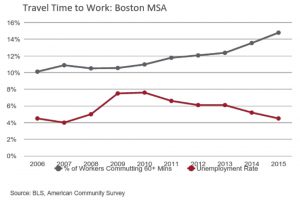Boston consistently ranks among the worst cities for traffic congestion, and it’s no secret that the region’s public transit system has been marred by overcrowding and delays. Not surprisingly, the Census Bureau recently ranked Greater Boston’s average commute the 6th longest in the nation at 31.4 minutes in 2015; representing a 10.6% increase from 2010.
While commuting to work in Greater Boston can be brutal, it may not be all bad news as the market’s congestion could point to a healthy economy. Simply put, more people on the roads and on the trains mean more jobs, shopping trips and tourists.
NAI Hunneman’s research department took a look at our data and the results are interesting. The chart below looks at the percentage of workers traveling 60+ minutes to work in the Boston MSA against the metro’s unemployment rate.
During times of economic decline (2008-09) Greater Boston’s unemployment rate was on the rise while the percentage of mega-commuters fell. As the local economy began to recover those commuting more than 60 minutes to work increased exponentially.
One could attribute this phenomenon to the urban core’s over-heated housing market which has likely pushed some residents further away from job centers. However, the population base in the city of Boston expanded by more than 13 percent in the last 15 years.
While too much congestion could ultimately become a drag on productivity, the data suggests a strong economy and traffic are connected.
Liz Berthelette is director of research at NAI Hunneman, Boston, Mass.


